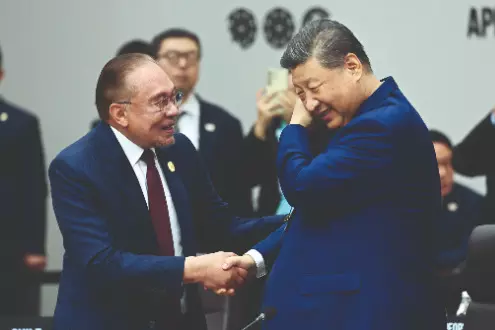APEC leaders call for commitment to cooperation, multilateral trade system

Gyeongju: Leaders of 21 Asian and Pacific Rim nations opened their annual summit Friday to discuss how to promote economic cooperation and tackle shared challenges, a day after President Donald Trump and Chinese President Xi Jinping agreed to take steps to ease their escalating trade war.
This year’s two-day Asia-Pacific Economic Cooperation summit in the South Korean city of Gyeongju has been heavily overshadowed by Thursday’s Trump-Xi meeting.
Trump described the meeting as a roaring success, saying he would cut tariffs on China, while Beijing had agreed to allow the export of rare earth elements and start buying American soybeans.
Their deals were a relief to the world economy, as experts previously warned that a failure to dial down trade tensions between the world’s two largest economies were certain to deepen global economic uncertainties. China on Friday reacted favourably to US President Donald Trump’s characterisation of his summit with President Xi Jinping in South Korea as a “G-2” meeting, saying that the two countries can jointly work for their benefit and that of the world.
While Trump described his meeting with the Chinese leader on Thursday as “G-2”, Xi said China and the US can “jointly shoulder our responsibility as major countries, and work together to accomplish more great and concrete things for the good of our two countries and the whole world”.
When asked at a media briefing here that Trump’s comments and Xi’s remarks point to the emergence of “G-2” grouping between the strategic rivals, Chinese Foreign Ministry spokesperson Guo Jiakun said, “As President Xi Jinping said at the meeting, China and the US should engage in positive interactions on regional and international platforms”, considering that the world today is confronted with many tough problems. But at the same time, China will follow an independent foreign policy and continue to work with other countries to uphold multilateralism, he added. After his talks with Xi, Trump told the media that he will cut the “fentanyl tariff” from 20 per cent to 10 per cent, which will bring the overall tariff on China from 57 per cent to 47 per cent, which will be lower than the tariffs he announced against India and Brazil.
Under the deal, China has agreed to lift export controls on the much-needed
rare-earth metals and imports of US Soybeans, while Washington agreed to lift restrictions on the export of semiconductor chips.
Asked about US Treasury Secretary Scott Bessent’s remarks that a trade deal with China could be signed as early as next week, Guo said China stands ready to work with the US to act on the important common understandings between the two presidents.
Meanwhile, while Trump left the APEC meet on Thursday, Xi had a busy day on Friday, meeting other key leaders attending the summit. He met Japanese Prime Minister Sanae Takaichi, Canadian Prime Minister Mark Carney and Thai PM Anutin Charnvirakul on Friday on the sidelines of the 32nd APEC Economic Leaders’ Meeting.



